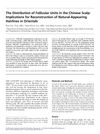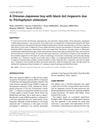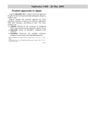August 2020 in “Research Square (Research Square)” Active treatment can help prevent scarring hair loss in SLE patients.
 January 2017 in “Journal of Cosmetics, Dermatological Sciences and Applications”
January 2017 in “Journal of Cosmetics, Dermatological Sciences and Applications” Chinese women's hair gets thinner and grayer with age, and scalp conditions change, especially after 40.
Low doses of certain Chinese herbs can promote hair growth, while high doses may inhibit it.
Chinese herb medicines can improve hair growth in mice.
 June 2002 in “Dermatologic Surgery”
June 2002 in “Dermatologic Surgery” Chinese scalps have fewer hair clusters than Caucasians, and transplanting 30 clusters per square centimeter creates a natural-looking hairline for bald Chinese individuals.
January 2013 in “Chinese Archives of Traditional Chinese Medicine”  125 citations,
December 2016 in “Molecules”
125 citations,
December 2016 in “Molecules” Substances from Chinese medicines show promise for immune support and disease prevention, but the way they are processed affects their effectiveness.
 68 citations,
May 2013 in “The American journal of medicine”
68 citations,
May 2013 in “The American journal of medicine” Traditional Chinese medicines with heavy metals can cause severe poisoning.
 25 citations,
November 2015 in “Journal of Ethnopharmacology”
25 citations,
November 2015 in “Journal of Ethnopharmacology” Certain Chinese herbs, especially Cacumen platycladi, can promote hair regrowth and reduce hair loss-related hormone levels in mice.
 23 citations,
July 2018 in “BMC Complementary and Alternative Medicine”
23 citations,
July 2018 in “BMC Complementary and Alternative Medicine” Certain herbal combinations in traditional Chinese medicine might be effective for treating hair loss, focusing on liver or stomach health.
17 citations,
May 2019 in “Journal of International Medical Research” Xiaoaiping reduces chemotherapy side effects and improves quality of life for breast cancer patients.
 15 citations,
October 2015 in “PLOS ONE”
15 citations,
October 2015 in “PLOS ONE” The Chinese version of the PCOS quality of life questionnaire is reliable and valid for Chinese-speaking women with PCOS.
 15 citations,
July 1997 in “Clinics in Dermatology”
15 citations,
July 1997 in “Clinics in Dermatology” Traditional Chinese medications can cause skin reactions, and better testing and reporting are needed to identify allergens.
 10 citations,
January 2019 in “Skin Research and Technology”
10 citations,
January 2019 in “Skin Research and Technology” Southern Chinese women with female pattern hair loss have less, thinner hair and smaller hair follicles.
 7 citations,
June 2016 in “Bone Research”
7 citations,
June 2016 in “Bone Research” A Chinese family had a child with a specific gene mutation causing vitamin D-resistant rickets, but the child improved with calcium and low-dose calcitriol.
 5 citations,
November 2016 in “Experimental and Therapeutic Medicine”
5 citations,
November 2016 in “Experimental and Therapeutic Medicine” BeauTop improves hair growth in androgenetic alopecia patients.
 4 citations,
March 2006 in “Journal of dermatology”
4 citations,
March 2006 in “Journal of dermatology” A Chinese-Japanese boy had a rare fungal infection on his scalp and skin, likely caught in China.
 3 citations,
February 2018 in “InTech eBooks”
3 citations,
February 2018 in “InTech eBooks” Traditional Chinese Medicine and acupuncture may improve Polycystic Ovarian Syndrome symptoms and reduce costs, but more research is needed.
2 citations,
April 2022 in “Medicine” A Chinese boy's scalp infection from a guinea pig was cured with medication.
 2 citations,
August 2020 in “Journal of Nutritional Science and Vitaminology”
2 citations,
August 2020 in “Journal of Nutritional Science and Vitaminology” Yellow Chinese chive extract helps protect mouse livers from damage caused by acetaminophen by activating an antioxidant pathway.
1 citations,
October 2022 in “Evidence-based Complementary and Alternative Medicine” Traditional Chinese Medicine may help treat hair loss but needs more research.
 December 2022 in “Journal of complementary medicine & alternative healthcare”
December 2022 in “Journal of complementary medicine & alternative healthcare” Traditional Chinese medicine improved hair loss in a teenager with alopecia.
 September 2022 in “Frontiers in genetics”
September 2022 in “Frontiers in genetics” A Chinese male with a new genetic mutation has a skin condition and severe urinary issues, with treatments having mixed success.
January 2022 in “International journal of dermatology and venereology” A Chinese man with KID syndrome had a new mutation in the GJB2 gene.
 December 2018 in “Journal of Patan Academy of Health Sciences”
December 2018 in “Journal of Patan Academy of Health Sciences” Many Chinese patients lose hair after weight loss surgery, especially women, and taking iron and zinc on their own doesn't help.

Better models and evaluation methods for alopecia areata are needed.
 March 2005 in “Inpharma Weekly”
March 2005 in “Inpharma Weekly” China approved Sinovac's flu vaccine, Japan approved RiUP for female hair loss, and Nippon Kayaku's three cancer drugs.

The number of CAG repeats in the androgen receptor gene doesn't significantly affect female pattern hair loss in the Han Chinese population.
August 2015 in “Traditional Chinese Medicine”  98 citations,
July 2011 in “Fertility and Sterility”
98 citations,
July 2011 in “Fertility and Sterility” An mFG score of 5 or more indicates above-normal hair growth in Southern Chinese women.




















